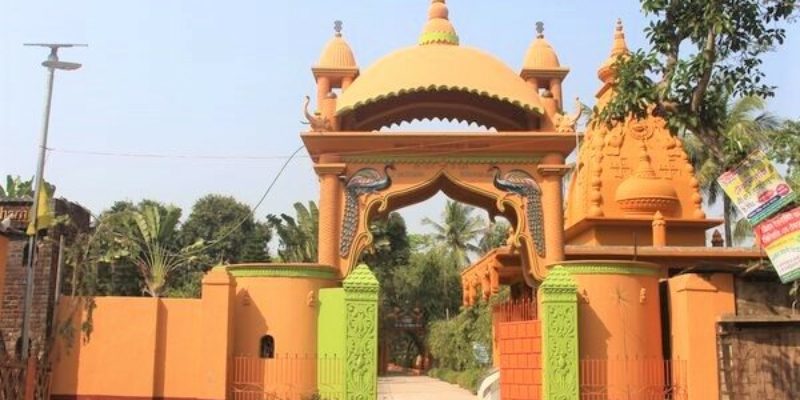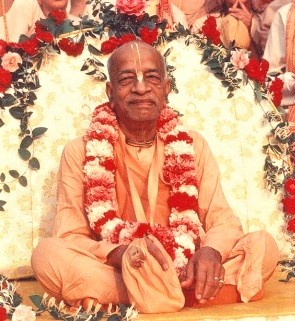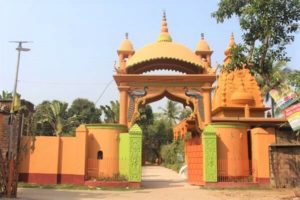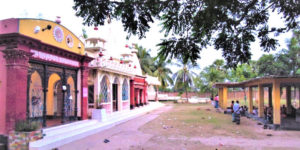vrsabhanutayakhyatahpurayovraja-mandale
adhunapuëòarékäkçovidyänidhi-mahäçayah
svakiya-bhävamasvadyarädhä-viraha-katarah
caitanyahpuëòarékäkçamaye tatavadatsvayam
prema-nidhitayakhyatimgauroyasmaidadauçukhi
madhavendrasyasisyatvatgauravamcasadakarot
tat-prakäça-viseso’pimiçraçré-mädhavomatah
ratnavatitu tat-patnikértidäkirtitabudhaih
“He who was previously known in Vraja as Våñabhänu is known here as Sri Pundarika Vidyanidhi. When Mahäprabhu was in His own mood as Kåñëa and felt the pain of separation from Rädhä, He would call him “father.” Gauracandra was happy with Puëòaréka and named him Premanidhi, or “the treasure house of love.”Mahäprabhu always treated him with respect because he was thedisciple of MädhavendraPuré. MädhavaMiçra is said to be his expansion and his wife Ratnavati was Kértidäin Vraja.”
(Gaura-gaëoddeça-dépikä 54)
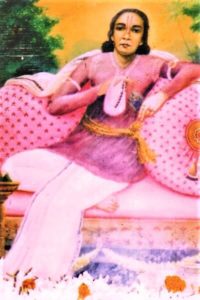
Pundarika Vidyanidhi’s father was Baneçvara, and his mother was named GaìgäDevé. He was born on Vasanta-païcami, the fifth day of the waxing moon in the month of Magh at Hathazariin Chittagong (now known as Chattogram). His home, or Çrépät, used to stand in the village of Mekhala, which is two miles east of the Hathajari police station.Vidyänidhi’s father was a Varendrabrähmaëa who hailed from the town of Baghiya in the district of Dhaka.
Pundarika Vidyanidhi was a zamindar from Chakrashala, and was extremely rich and very pure in his actions. He was a Varendra Brahmin, whose lineage is extremely respectable. Sometimes he stayed in Chattogram and sometimes in Navadvépa. He wasa disciple of MädhavendraPuré.
Puëòaréka came to Navadvépa because he wished to live by the banks of the Ganges. Mahäprabhu, the indweller of all beings, knew prior to his coming that he had such a desire, and one day in the assembly of devotees started crying and calling out, “Puëòaréka, My friend, My father!” When His associates asked Him why He was crying in this way, the Lord described Pundarika Vidyanidhi to them in the following way: “His character is quite extraordinary. Just by hearing his name, the whole world is purified, but he dresses and looks just like a materialistic person in the midst of the accouterments of the life of pleasure. No one is able to recognise him as a Vaiñëava, yet he remains constantly merged in the deep ocean of devotion for Kåñëa.
He never bathes in the Ganges because he is afraid to touch the holy waters with his feet, which would show disrespect. He only goes to take darçana of the Ganges at night, and from a distance. He cannot bear to see people engaged in offensive behaviour to the Ganges by gargling, cleaning their teeth, or washing their hair in her waters, so he never goes there during the daytime. He never engages in worship of the Deity without having taken a drink of Ganges water. He has homes in both Chittagong and in Navadvépaand will soon be arriving here. Because of his apparently materialistic behavior, you will not be able to recognise him, but I feel unwell because I am not able to see him.”
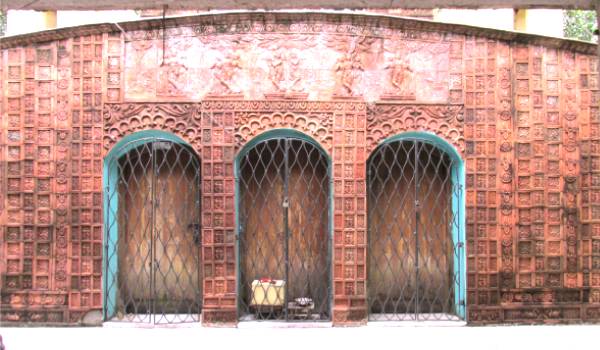
Çréla GadädharaPaëòita, Mukunda Datta, and Väsudeva Datta were also originally from Chattogram and were thus acquainted with Pundarika Vidyanidhi. Indeed, GadädharaPaëòita’s father,Madhava Miçra, was his good friend. Mukunda Datta knew Puëòaréka’s transcendental personality and that he was a Vaiñëava, but Gadädhara did not, even though he was from the same town. This was, of course, a pretense for the sake of the lélä.
When Puëòaréka was living in Navadvépa, MukundaDatta told Gadädhara one day that he wanted to introduce him to a great Vaiñëava. Gadädhara Paëòitawas a brahmacäré from childhood, extremely detached from the senses and ascetic in his lifestyle. When he saw Puëòaréka sitting on comfortable cushions covered in sheets as white as the foam of milk, wearing very expensive clothes and perfumes, smoking from a hookah, and generally surrounded by all the trappings of a sensual lifestyle, he was unable to recognise him as a Vaiñëava. Indeed, he felt let down.
Mukunda could see from Gadädhara’s face what was going through his head, and in order to bring out Puëòaréka’s inner mood, he recited two verses from Çrémad–Bhägavatam that kindle the flames of love for Kåñëa.
ahobakéyaàstana-käla-küöaà
jighäàsayäpäyayadapyasädhvé
lebhegatiàdhätry-ucitäàtato ‘nyaà
kaàvädayäluàçaraëaàvrajema
(SB. 3.2.23)
pütanäloka-bäla-ghné
räkñasérudhiräçanä
jighäàsayäpiharaye
stanaàdattväpa sad-gatim
(SB.10.6.35)
As soon as he heard these two verses in glorification of Kåñëa’s mercy, ÇréPuëòarékaVidyänidhi cried out “Ha Kåñëa!” and fell in a swoon. He began to roll on the floor in ecstasy, knocking over the hookah and tearing his clothes.
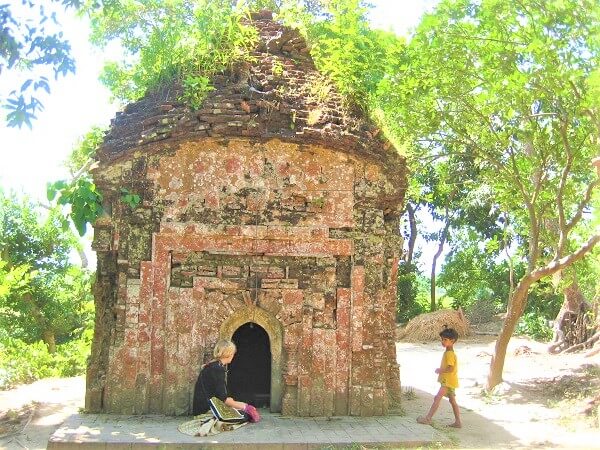
When he saw these transcendental symptoms of love on Puëòaréka’s body, Gadädhararealised that he had committed an offense, which he began to regret. He decided that the only way to rid himself of this offense would be to take initiation from Puëòaréka, and he related this idea to Mukunda. Mukunda then communicated his desire to Puëòaréka, who happily set a date for the auspicious event. Mahäprabhu also gave His approval, and so Gadädhara took mantra initiation from PuëòarékaVidyänidhi.
It is stated in Bhakti-ratnäkara that Mahäprabhu celebrated the birth of Rädhäräëéat Sri Pundarika Vidyanidhi’s home. VåndävanadäsaÖhäkura concludes his Caitanya-bhägavata with the following glorification of Pundarika Vidyanidhi:
“The Supreme Lord Gauräìga called out the name of this devotee, crying,‘Puëòaréka, My father!’ Anyone who hears about his life and activities will undoubtedly attain Kåñëa’s lotus feet.”
(Cb. Antya-khaëda 10.183)
In 1982, ISKCONtook up the care of the home of Pundarika Vidyanidhi. His Holiness Jayapataka Swamiinstalled ÇréÇréVärñabhänavé-Muräri and Gaurasundara deities in the temple.The bhajana-kuöiräof PuëòarékaVidyänidhi, a Giriräjaçéla, and both Rädhä-kunòa and Çyäma-kunòaare still visible now. The bhajana-kuöiräof both VäsudevaDatta and MukundaDattaaresituated a small distance from there.
How to Go There
Buses are available from Chattogram to Hathazari. Get down at Hathazari and take an auto-rickshaw to Sri Sri Pundarick Dham, ISKCON temple.
You can see other Holy Places. Click Here

